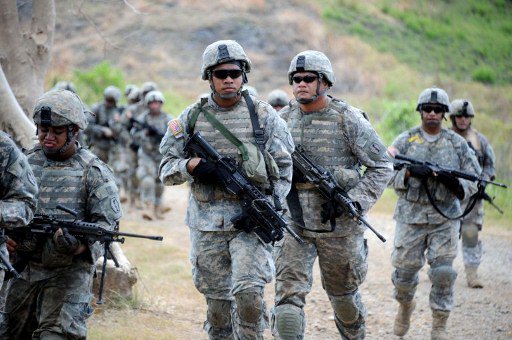
Philippine troops in full battle gear in Baliktan training exercises with their US counterparts in 2017. (File photo from Agence France-Presse)
MANILA, Philippines — Four presidential candidates are divided on whether they will establish a status of forces agreement (SOFA) with countries other than the United States and its allies.
These are the candidates who took part in the presidential debates sponsored on Tuesday by the Sonshine Media Network International (SMNI) — labor leader Leody de Guzman, former Defense Secretary Norberto Gonzales, former Sen. Ferdinand Marcos Jr., and former presidential spokesperson Ernesto Abella.
Only De Guzman said definitely that he would block the establishment of a SOFA to protect the country’s independence.
“I stick to my stand that we should be independent, especially in military matters — as in preparations for war — that we should not get involved in it,” he said in Filipino.
“We will get no benefit out of war. The only ones who will benefit from that are corporations that make ammunition and arms. They are the only ones who profit every time there’s a war,” he added.
He also vowed to scrap the Mutual Defense Treaty and Visiting Forces Agreement — both between the Philippines and the US.
(Speaking on the issue of armed struggle, he also said he would abolish the National Task Force to End Local Communist Armed Conflict.)
“Because it’s difficult for us to decide if there’s a gun pointed at our head, even our agreement with China, let’s cut that,” De Guzman said.
The Philippines should instead establish agreements with countries that wish to address the issues of climate change, world hunger, and inequality.
Both Gonzales and Marcos said they were open to making a forces agreement with other countries, but the government should first assess the advantages for the Philippines.
“I would appreciate it if we had preliminary talks first because, in the first place, the system familiar to our armed forces is America,” Gonzales said. “It’s very very difficult to immediately change systems. So it doesn’t mean that we will not be open to something friendly with the Russians.”
He added that the Philippines could begin by sending its military to train in Russia to adjust to the changes.
“It’s very difficult to train when your systems do not match,” he explained.
For his part, Marcos stressed the government should look into how a SOFA with Russia would be an advantage to the country,
“For the simple reason that it is an entirely novel concept for our two countries together,” he said.
He then noted that multiple SOFAs with several countries might give the military a “logistical problem.”
Abella said the government should first “calibrate its responses because our capabilities are asymmetrical especially because we’re not at par with them even in terms of capability and skills.”
“On the other hand, we need to continue to develop our own internal capabilities so that we can maintain our independent foreign policy,” he added.
RELATED STORIES
Group urges Duterte to abrogate ‘one-sided’ VFA, EDCA
Suspension of VFA abrogation extended
No backdoor talks for VFA’s retention, says envoy